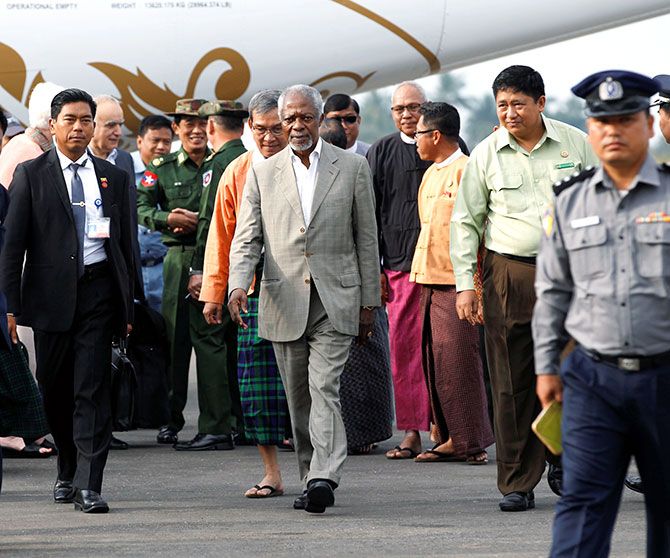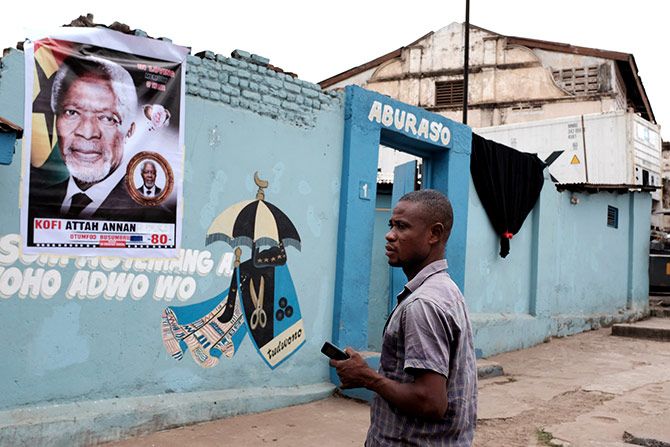'Kofi Annan will be remembered more for his Nobel Prize and related glory rather than Rwanda and Volcker,' notes Ambassador T P Sreenivasan with whom he worked in the UN.

Kofi Annan (rhymes with 'Sophie Cannon' according to Shashi Tharoor), who passed away on August 18, recently was the quintessential international civil servant: Well dressed, suave, politically correct, polite and courteous, and more than anything else, unflappable.
The first United Nations secretary-general to emerge from the UN system, his strongest point was his familiarity with virtually every department of the mammoth institution, ranging from accounts and budget to peace making, peacekeeping and peace building.
His networking among the UN staff and delegates gave him an advantage over all his predecessors who were often bewildered by the many intricacies of the UN system.
But this very strength infuriated the permanent members of the Security Council who felt that he ran circles around them with rules and regulations and they vowed after his term that never again would they have such an expert as the secretary-general.
In their eyes, ideal secretaries-general should be colourless and odourless and others inevitably came to grief.
But Annan survived and flourished till his demise.
I worked with him in the early 1990s when I was the chairman of the once powerful UN committee on programme and coordination and, as controller, he was my closest adviser.
The job of the CPC was to turn all the decisions of the UN general assembly into programmes to assist the financial and budget authorities to plan expenditure.
It also had the responsibility to coordinate the work of the specialised agencies, though the powerful heads of agencies did not care about the CPC.
The CPC was perhaps the only committee which had a finger in every pie and a multitude of issues came up there, which needed familiarity with rules and regulations and a rich imagination to give helpful interpretations to them.
Annan, who spent a lot of time with the committee when it was in session, was never at a loss for convincing words to defend the secretariat.
It was an education for me to learn from such a superb UN civil servant.
Annan built his reputation further as the head of the UN department of peacekeeping operations, which was a complex activity of the United Nations.
Soon after the Cold War, the number of peacekeeping operations increased significantly during then secretary-general Boutros Boutros Ghali's term. Ghali earned the nickname 'General' because of his enthusiasm to deploy troops everywhere to enforce peace. He even proposed a standing army at his command to be used in emergencies.
There were successful peacekeeping operations under Annan's watch as the head of the concerned UN department, but there were also disasters like Rwanda, Somalia and Bosnia.
The worst was Rwanda, where 800,000 people were massacred in 100 days under the very nose of the UN even after Annan was given a warning about an impending genocide from those on the ground. He denied that the warning was specific, but later expressed regret over inaction.
'I, myself, as head of the UN's peacekeeping department at the time, pressed dozens of countries for troops,' he said in 2004. 'I believed at that time that I was doing my best. But I realised after the genocide that there was more that I could, and should, have done to sound the alarm and rally support.'
'This painful memory, along with that of Bosnia and Herzegovina, has influenced much of my thinking, and many of my actions, as secretary-general,' he said.
But despite these failures, he was elected secretary-general, because the US vetoed a second term for Ghali and wanted Africa to have another secretary-general to complete the African turn for two terms.
Subsequently, Annan was given a second term, even though Asia had made a claim at that time. Moreover, he was given the Nobel Prize for Peace personally, together with the UN itself for its humanitarian and peace building efforts in 2001.
The worst crisis in his entire career came in 2005 when an independent inquiry committee appointed by Annan himself at a cost of $34 million under Paul Volcker documented a huge amount of evidence regarding manipulation of the $60 billion oil-for-food programme by the Saddam Hussein regime with the complicity of more than 2,200 companies in 66 countries as well as a number of prominent international politicians.
It painted an ugly tableau of bribery, kickbacks, corruption, and fraud on a global scale -- without a doubt the biggest financial scandal in modern history.
Since a number of UN officials were involved, Annan was asked to take moral responsibility.
Moreover, it was suspected that a Swiss company, which employed his son, was also involved in the scandal.
Many heads rolled in the UN and outside, including India's then external affairs minister K Natwar Singh whose name appeared only in a footnote to the Volcker report as someone who benefited from the scandalous deal.
There were also reports that Annan had got the report amended before it was published to save himself. US congressmen and senators cried foul and asked for a thorough reform of the UN.
Yet, Annan went on to complete his term and to become a renowned global figure for peace, humanity and justice.
I was delighted to see him at a meeting in Pretoria of the 'Elders', established in Nelson Mandela's name to resolve global disputes. We briefly chatted about common friends in New York and he was as courteous and friendly as I had known him before he became the UN secretary-general and a Nobel Laureate.
Annan was a good friend of India, even though his chef de cabinet was from Pakistan. He maintained the position that he had a role in Kashmir as it was on the agenda of the UN security council, but he never took the position that the UN resolutions should be implemented or that he should intervene in any manner.
'The secretary-general continues to call on India and Pakistan to exercise restraint and encourage them to resolve their differences, including over Kashmir, by peaceful means' was all that he would say.
His statements on the mandatory nature of the security council resolutions were also helpful. He supported UN reform in general, but left it to the member States to find a formula for expansion of the Security Council.
He appointed General Satish Nambiar from India to the Committee he established to study the matter and placed the Indian recommendation on par with the majority opinion in his report, In Larger Freedom.
As I recounted in an earlier Rediff column, 'on the day Rajiv Gandhi was assassinated, I happened to be in the delegates dining room at the UN, totally oblivious of what had happened back home. Annan, who was observing me from another table, realised from my body language that I was unaware of the tragedy.'
'He walked over to my table slowly, took me aside and said that as soon as I finished my lunch, I should go down to the lounge and watch CNN. He did not answer when I asked him what happened so as not to spoil the mood of the party.'
'Although he was cool and collected as he spoke to me, I knew him well enough to realise that something serious had happened. I lost no time in rushing to watch CNN.'

What made Kofi Annan a 'teflon' secretary-general was his thorough knowledge of the UN system, which permitted its chief to distance himself from the misdeeds of the institution as the SG was supposed to act at the behest of the member States, particularly the security council.
By maintaining his persona as a champion of peace, progress, prosperity and welfare through the Millenium Goals and other programmes, he kept himself out of the follies and foibles of the UN.
Someone observed that he spoke as 'we' when he talked of the UN's mistakes while he used 'I' when he spoke on the lofty principles that he espoused as an individual.
This helped him to keep a clean conscience, even in the face of grave charges. He will be remembered more for his Nobel Prize and related glory rather than Rwanda and Volcker.
T P Sreenivasan,(IFS 1967), former Ambassador of India and Governor for India of the IAEA is Chairman, Academic Council and Director, NSS Academy of Civil Services, and Director General, Kerala International Centre.
You can read more columns by Ambassador Sreenivasan here.










